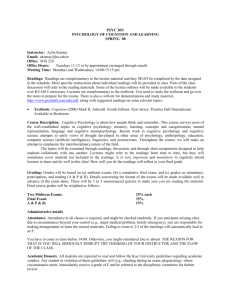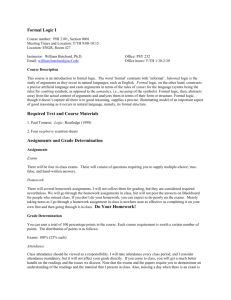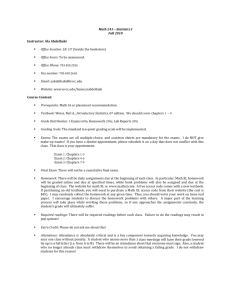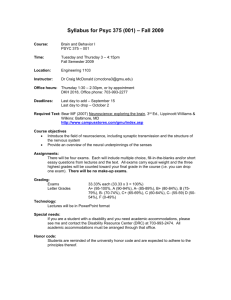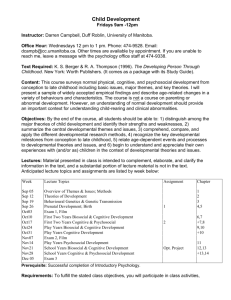Introduction to Cognitive Psychology
advertisement
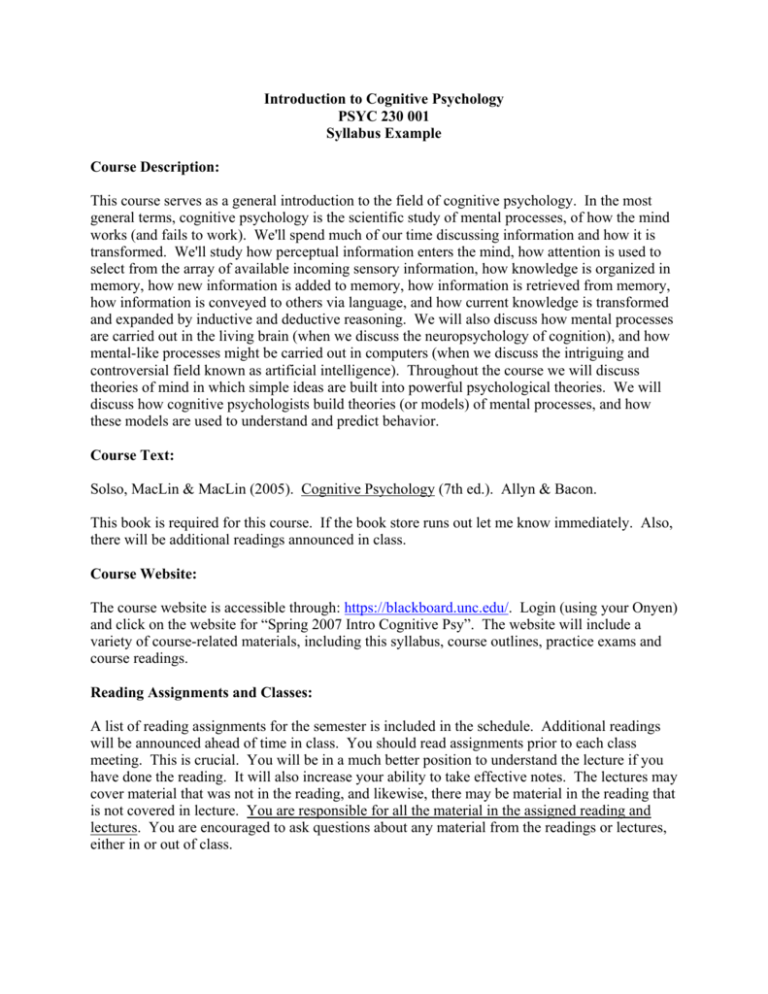
Introduction to Cognitive Psychology PSYC 230 001 Syllabus Example Course Description: This course serves as a general introduction to the field of cognitive psychology. In the most general terms, cognitive psychology is the scientific study of mental processes, of how the mind works (and fails to work). We'll spend much of our time discussing information and how it is transformed. We'll study how perceptual information enters the mind, how attention is used to select from the array of available incoming sensory information, how knowledge is organized in memory, how new information is added to memory, how information is retrieved from memory, how information is conveyed to others via language, and how current knowledge is transformed and expanded by inductive and deductive reasoning. We will also discuss how mental processes are carried out in the living brain (when we discuss the neuropsychology of cognition), and how mental-like processes might be carried out in computers (when we discuss the intriguing and controversial field known as artificial intelligence). Throughout the course we will discuss theories of mind in which simple ideas are built into powerful psychological theories. We will discuss how cognitive psychologists build theories (or models) of mental processes, and how these models are used to understand and predict behavior. Course Text: Solso, MacLin & MacLin (2005). Cognitive Psychology (7th ed.). Allyn & Bacon. This book is required for this course. If the book store runs out let me know immediately. Also, there will be additional readings announced in class. Course Website: The course website is accessible through: https://blackboard.unc.edu/. Login (using your Onyen) and click on the website for “Spring 2007 Intro Cognitive Psy”. The website will include a variety of course-related materials, including this syllabus, course outlines, practice exams and course readings. Reading Assignments and Classes: A list of reading assignments for the semester is included in the schedule. Additional readings will be announced ahead of time in class. You should read assignments prior to each class meeting. This is crucial. You will be in a much better position to understand the lecture if you have done the reading. It will also increase your ability to take effective notes. The lectures may cover material that was not in the reading, and likewise, there may be material in the reading that is not covered in lecture. You are responsible for all the material in the assigned reading and lectures. You are encouraged to ask questions about any material from the readings or lectures, either in or out of class. Attendance: Attendance is not mandatory, but neither is passing. Attendance is the responsibility of the student. If you find it necessary to miss class, you do not need to inform me. However, each student is responsible for all material presented in class. This includes announcements of exam dates, announcements of additional readings, announcement of schedule changes, etc. Please arrange to obtain notes from a classmate if you are absent. Evaluation: You will be evaluated via four in-class exams: (1) Exams Exams I - III (100 pts. each) Final exam (150 pts.) There will be three exams during the semester (see schedule for dates). Exams will cover material from the lecture and readings. None of these regular exams will be comprehensive; each will cover only the immediately preceding material. The exams will consist of multiple-choice questions, short answers and identification. The final exam is comprehensive and will have a similar format. (2) Short Paper (50 pts): A short (2-3 page) paper. The paper will be an exercise in developing a theory of a psychological phenomenon, using the theory to make predictions and discussing how the predictions might be tested in an experiment. This project will involve summarizing a few journal articles on a topic in memory research and developing a research proposal for further investigation. We'll talk more about the paper later in the semester. (3) In-Class Writing Assignments (25 pts): Several times throughout the semester, you will be asked to write short (1 page or less) response to questions or problems posed by our current readings and lecture. These assignments are designed to be brief (10 – 15 minutes) and require deeper consideration of the course materials. Final Grade: The scores for the exams, short paper, and in-class writing assignments will be added together to arrive at a final score. Your score will be converted into a letter grade as follows (plusses and minuses will be used at the extremes of each grade range): Final Score (out of 525 total pts.) 472 or above (90% or above) Final Grade A range 420 - 471 367 - 419 315 - 366 below 315 (80% - 89%) (70% - 79%) (60% - 69%) (below 60%) B range C range D range F Finally, a note on cheating and plagiarism. Don't. If caught, you'll get an 'F' in this course and I will refer you to the student judicial office for appropriate disciplinary action. Tentative Schedule of classes and readings: (subject to change with notice) Date Week 1: Introduction and History Chapter 1 Week 2: History and Cognitive Neuroscience Chapter 1 Chapter 2 Week 3: Cognitive Neuroscience Sensory Information Processing Chapter 2 Chapter 3 (pp. 70-82) Week 4: Sensory Information Processing Chapter 3 (pp. 70-82) Week 5: Pattern Recognition Chapter 4 EXAM I - Thursday, 2/8 Week 6: Attention and Consciousness Chapter 3 (pp. 82-103) Chapter 5 Week 7: Attention Theories of Memory Chapter 7 Week 8: Theories of Memory Chapter 7 Week 9: Theories of Memory Memory Structure and Processes Chapter 6 Week 10: Spring Break NO CLASS: 3/12 – 3/16 Week 11: Memory Structure and Processes Semantic Memory and the Representation of Knowledge EXAM II - Thursday, 3/22 Chapter 6 Chapter 9 Week 12: Semantic Memory and the Representation of Knowledge Chapter 9 Week 13: Language Chapter 11 Week 14: Language Reasoning Chapter 11 Chapter 14 Week 15: Reasoning Chapter 14 EXAM III - Thursday, 4/19 Week 16: Catch-up and review for Final Chapter 15 (time permitting) FINAL EXAM Tuesday, May 1 - 8:00
